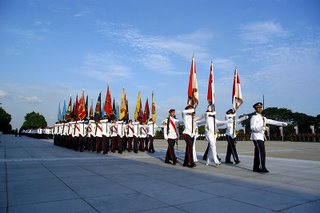the men did not move
 What does it say when an accident turns out to be the brightest spot in an event? It could mean that the event was a trial in mediocrity that was kindly vindicated by Murphy's Law, or it could be as an imperfection in a masterfully-crafted work of art that gives it its value in uniqueness. The SAF Day Parade 2006 was the latter.
What does it say when an accident turns out to be the brightest spot in an event? It could mean that the event was a trial in mediocrity that was kindly vindicated by Murphy's Law, or it could be as an imperfection in a masterfully-crafted work of art that gives it its value in uniqueness. The SAF Day Parade 2006 was the latter.It happened toward the end of the ceremony, as the parade commander was preparing to order the contingents off for the march-past. Facing the dignified assembly of spectators, with his back to his parade, he bellowed the order for the Colours (flags representing the various formations) to be raised, as he had done so countless times during the rehearsals over the past month. But nothing happened. The men did not move. It took him approximately three seconds to realise his error, that they were not in the correct posture for that command to be given: they were in the "at ease" position instead of the prerequisite "at attention" for them to properly execute the order. Recovering from initial uncertainty and with a remarkably confident "Semula!" (an appended nullifying command) which overtook the few seconds of doubt, he then went on to call his men to attention and reissued his order for the Colours to be raised.
Now this could have turned out to be an international embarrassment in front of the gamut of dignitaries, local and foreign, invited to watch the SAF showcase the regimental skill and discipline of its finest. But that was not to be. Instead, that gaff turned out to be a shining moment, showcasing exactly and exactingly the regimental skill and discipline of the SAF's finest for that one reason: the men did not move.
Those of us who have participated in our fair share of parades know that when a wrong command is given, it is inevitable that the less alert amongst the contingents' members would react to it by attempting to excute it even when they are in an inapproriate posture to do so (it does not help that the commands are given in Malay to a predominently Chinese demographic). In doing this, their sudden movements, which quickly become confused and awkward abortions as they realise no one else moved, are like highly visible fractures in the integrity of the contingents' stolid constitution. It is a given, even amongst the most seasoned parade sergeant majors (the men who orchestrate the parade rehearsals, traditionally known as the "Kings of the Parade Square") that some men, somewhere would perpetrate this; eventhough it would not be entirely their fault, as they were ironically, just following orders. That is how most parades are ruined.
But not the one held on the First of July, 2006. The men did not move. Of the thousand men on the parade square, not a twitch was observed when the wrong orders came. One thousand bodies that shared a singular impregnable mind. It would not have been inappropriate if the applause that had accompanied every sharply executed drill throughout the parade had also rung out in the seconds after that defining command. The silence and stillness that enveloped the square in what could have been cynically interpreted as a disobedience of orders spoke volumes about the alertness and mental fortitude of each individual soldier who represented the SAF on the parade square that day (as the Regimental Sergeant Major of the SAF later remarked, they were truly "thinking soldiers"). Beyond that, it spoke volumes about the effort and conscientiousness the men had put into the countless sapping rehearsals that marked the month before. It spoke volumes about the quality and ethic of the SAF.
It was also volume that marked the recitation of the SAF Pledge and the singing of the National Anthem moments before. The concluding line of the pledge where the men swore to protect the independence of the nation "with our lives!" was shouted with such frightening conviction that the shivers that went up my spine emerged as an emotional lump in my throat. And the anthem that had been sung into numbness at every single rehearsal suddenly came alive again, reanimated by the unrehearsed emotion of the moment.
It is necessary here to record that despite the mistake, the parade commander had been an inspiration for me and my colleagues by the absolute professionalism, conscientiousness and astuteness he displayed during the rehearsals every step of the way. And in fairness, the parade format that he had confidently mastered had to be abridged at the last minute because the President had taken ill and could not attend. Nerves get the better of even the best. Even then, history will associated him not with his oversight but with the greater good that came of it.
All told, it was a humbling and moving experience to have been part of this. Come the tenth day of August this year, I will look back on this day and think that the two years that led to this was worth it. Because while the men did not move, I, and many others were.